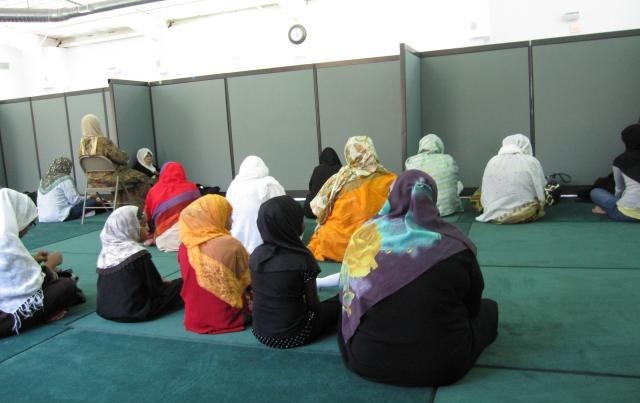

Dear all,
The question of religion and a woman’s place within the scheme of things it dictates is still a vexed one. It’s a problematic question because the pervasive thinking still is that women are secondary citizens, inferior beings and, as ‘objects of sexual temptation’, they cause trouble and chaos.
Most religions advise either avoiding or disciplining women because they are inferior and unreliable: My mother was once told by a Hindu astrologer that in her past life she had been a man who had embezzled a Brahmin banya and so as a punishment she had been reborn as a woman. Hmm!
Apparently now there is also a growing trend among Orthodox Jews in the US of trying to avoid contact with women as this is proscribed by Jewish texts. Several recent news reports tell of delayed flights and disgruntled passengers as incidents of Orthodox Jewish men refusing (or resisting) having to sit next to women on flights have been on the increase.
Christianity hasn’t progressed much either. Women priests are being ordained in the Anglican Church but the question of women bishops still remains really controversial. Although why this should be so frowned upon in this modern world, where we constantly enact legislation to ensure equal rights and deter discrimination, is unclear.
Meanwhile, Saudi Arabia, the custodian of Islam’s holiest sites which are Haj and Umrah destinations for the world’s (over 2 billion) Muslims, continues to practice what Egyptian writer Mona Eltahawy labels "gender apartheid": women can only be defined by the man they are forced to be dependent on, they are nothing without a mehram and they cannot even travel without this male guardian’s permission. They are forbidden to drive cars or other moving vehicles and local policemen can humiliate any one of them by ticking them off for not wearing Islamic enough garb.
Of course if you don’t appreciate Saudi laws, you can simply avoid living in Saudi Arabia but the problem is wider: all over the globe Muslim men are continuing to enforce the idea that women must be secondary citizens in their community.
A few years ago I went to a mosque in South London. I was with my spouse and we had gone for the funeral prayers of my aunt. As soon as we entered the mosque, the bearded staffer communicated to me in quite an unpleasant tone that I should quickly disappear into the women’s section. "Sister! Go upstairs!" he kept shouting at me, seeming unhappy even that I was speaking to my husband. He kept gesturing angrily at me while trying not to meet my eye which, strangely, was both amusing as well as insulting.
So off I went, out of his sight, into the women’s section of the mosque where I discovered that there was a sort of balconied hole in the floor between the two levels through which we could see a portion of the men’s section (we could see the backs of their heads). The women took positions for prayer but then some fundo from downstairs made an announcement that the women had to assemble behind a screen in the upstairs section. This was completely unnecessary and certainly very irritating, and it really reinforced the message that women must be made invisible in this congregation.
I was fairly outraged by this behaviour, expecting mistakenly that this Muslim place of worship would be calming. I don’t really enjoy being regarded as an irritant or lesser being just because I happen to be female, so this mosque experience left me feeling pretty resentful.
And apparently my reaction has not been uncommon: in 2004 a group of Muslim women in the US headed by author Asra Nomani actually formulated The Islamic Bill of Rights for Women in the Mosque. This consisted of 10 points which basically cover the Muslim woman’s rights to be treated courteously and as a fellow human being in her place of worship.
Nomani had been insulted by her mosque’s insistence that women not be allowed to enter by the front entrance and be confined to the back of a balcony area. Once inside the building, her refusal to be invisible and creep in, apologetically, through the back door led to the men at the mosque signing a petition to have her banned from the mosque on the basis that she was a ‘troublemaker’!
An excellent article by Saeed Rahman recently in the Tribune magazine introduced me to The Women’s Mosque of America -- a Los Angeles initiative in which Friday prayers for women are organised at a local community faith centre and the Khutba is given by a woman. What is surprising about the inclusive and tolerant project (one board member was quoted as saying "we will not be policing your scarf or your clothing…this is a … space that welcomes all Muslims, from every school of thought and at any level of religious practice") is that many people had hesitations about it. One woman said she was "unsure if a women’s mosque was allowed in Islam" and her family warned her that she might be displeasing Allah by attending such a congregation.
As young Muslims rediscover their religion and try to reorganise their community, it is key that a conscious effort be made to have misogyny taken out of the mosques. Women should not have to slink in through the back door or try to be invisible. Nor should they be banned if they protest distasteful strictures or question certain practices.
But it is not just fundo men on a power trip who are responsible for the existing state of affairs: the authorities in progressive, democratic countries need to stop equating the Muslim community with the men who speak for it, and these countries have a responsibility for ensuring that their citizens are not subjected to discrimination on any basis.
In other words: stop pandering to the fundos and start working to end the misogyny.
Best wishes,